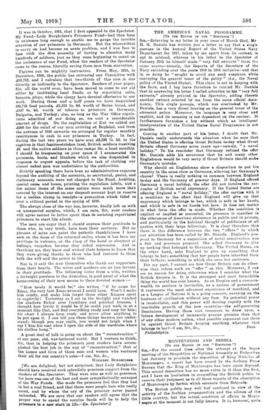THE AMERICAN NAVAL PROGRAMME.
[To TER EDITOR or IRS " EIPICTATOR."]
Sits,—Referring to my letter in your issue of March 22nd, Mr H. G. Daniels has written you a letter to say that a single passage in the Annual Report of the United States Navy Department for 1917, taken by me apart from its context, is apt to mislead, whereas in his letter to the Spectator of January 25th he himself made "very full extracts" from the some source—namely, the Reports of the Secretary of the Navy extending over the years 1913 to 1918 inclusive—and that in so doing he "sought to avoid any such suspicion while conveying the general tenor of the policy" (i.e.. the Naval policy of the United States). This claim is not In keeping with the facts, and I beg leave therefore to remind Mr. Daniels that in answering hie letter I celled attention to his "very full extracts," already printed in the Spectator, adding thereto another extract selected by me from the same official docu- ments. This single passage, which was overlooked by Mr. Daniels, has a very direct bearing on the general tenor of the aforesaid policy. Moreover, its language is very clear and explicit, and its meaning is not dependent on the context. It furthermore furnishes a key without which an intelligent interpretation of the United States Naval Programme is not possible.
Coming to another part of his letter, I doubt that Mr. Daniels really understands the situation when he says that the United States is offering Greet Britain to-day what Great Britain offered Germany some years ago—namely, " a naval holiday." To his reminder that Germany refused the offer Mr. Daniels. adds his assurance that be and many other Englishmen would be very sorry if Great Britain should make Germany's mistake.
Why should an Englishman show a disposition to put his country in the same class as Germany, allowing her Germany's choice? There is really nothing in common between England to-day and the Germany of pre-war days. If England offered Germany a naval holiday, the offer did not involve the sur- render of British naval supremacy. If the United States are offering England a " naval holiday," the offer carries with it a condition to the effect that England will give up that supremacy which belongs to her, which is safe in her hands, and which is safe in no hands but hers. It does not matter in what form the offer is made. Whether the condition ii explicit or implied or concealed, its presence is manifest in the utterances of American statesmen in public and in private. and particularly in the habitual thought of politicians of all parties with their large followings. It is clear therefore that thorn is this difference between the two "offers " to which our attention has been called by Mr. Daniels. England's pro- posal to Germany for a suspension of naval construction was a fair and generous proposal. She asked Germany to give up nothing that belonged to Germany. The United States, on the other hand, asks England to give up something that belongs to her; something that her people hare inherited from their fathers; something to which she owes her existence.
For my part, I cannot see bow Great Britain can do other- wise than refuse such an " offer " as this. Moreover, I can see no reason for doing otherwise when I consider what the British Empire is. It is the strongest and most formidable thing the world has ever known. As an Empire and a common- wealth its position is invincible, as. a system of government it represents the most advanced experience of mankind, and as a League of Nations it is a going concern, carrying on the business of civilization without any fuss. Its potential power is incalculable, and this power will develop rapidly with the inevitable growth of the now countries—the self-governing Dominions. Having these vast resources to draw upon, a future development of immensely greater promise than that of any other modern nation, what possible argument can there be against Great Britain keeping anything, whatever that






































 Previous page
Previous page